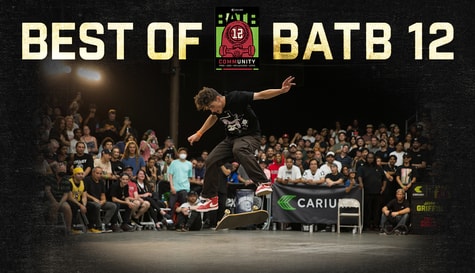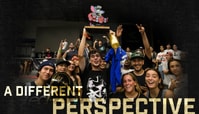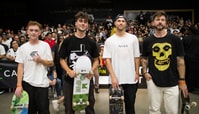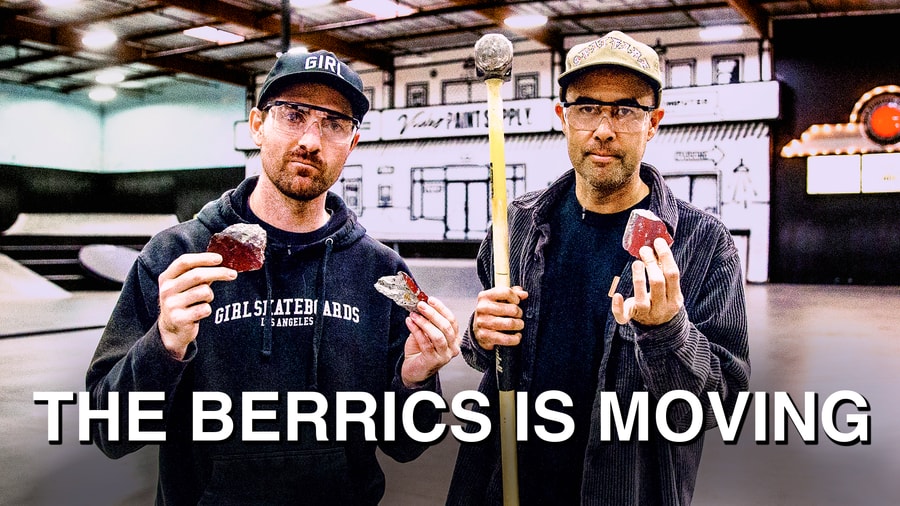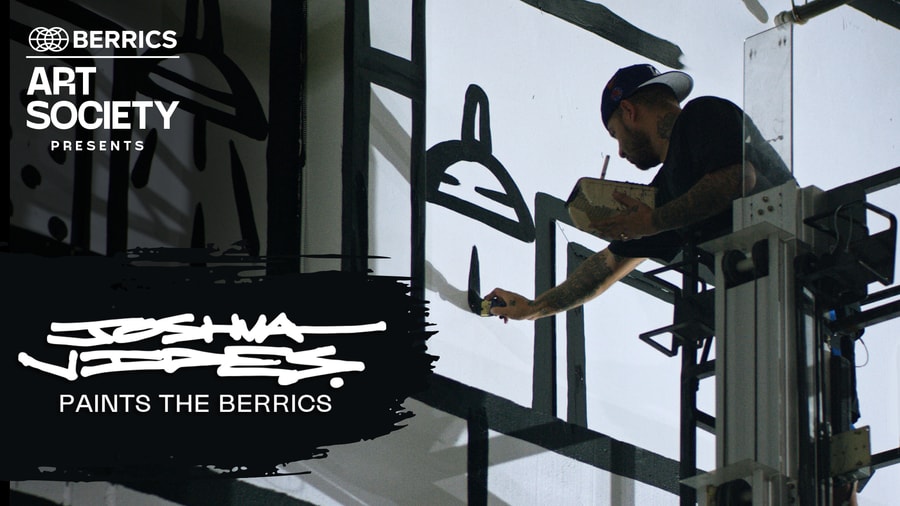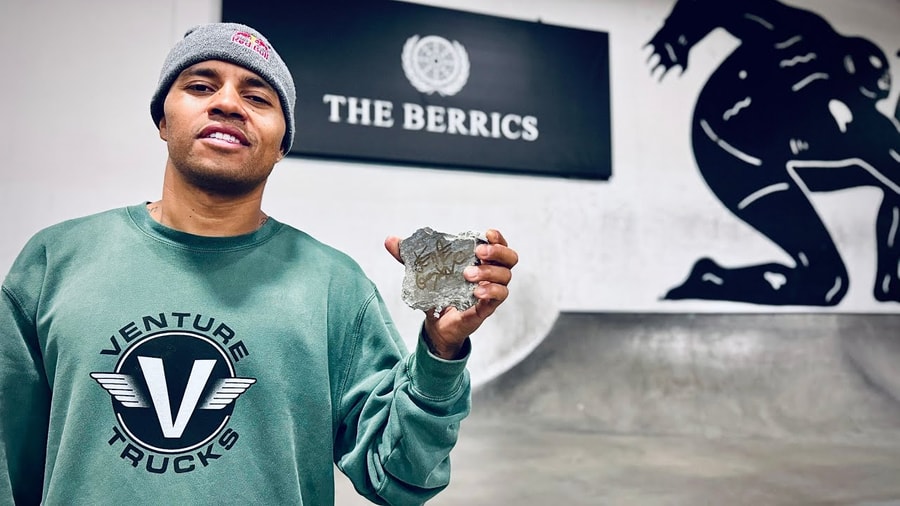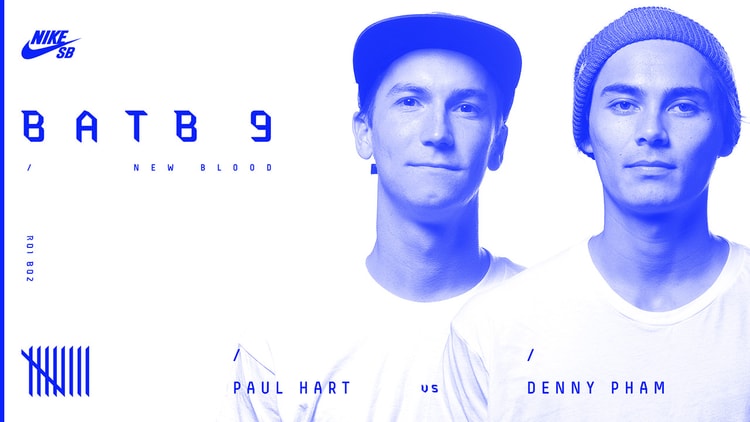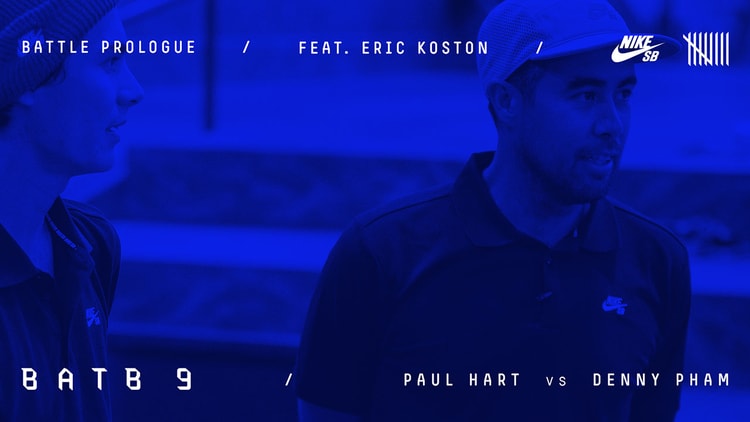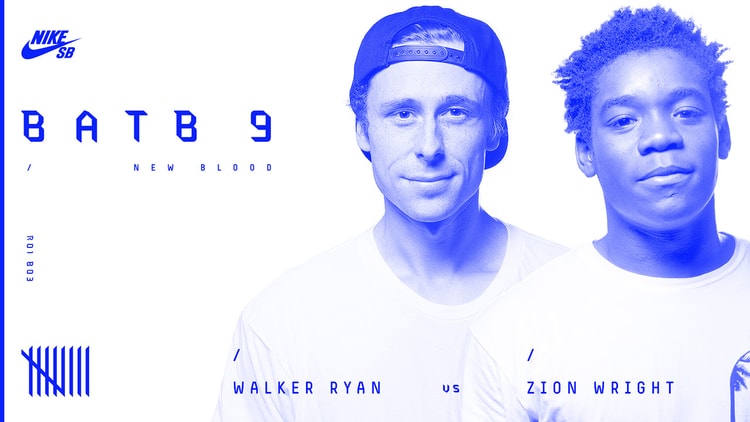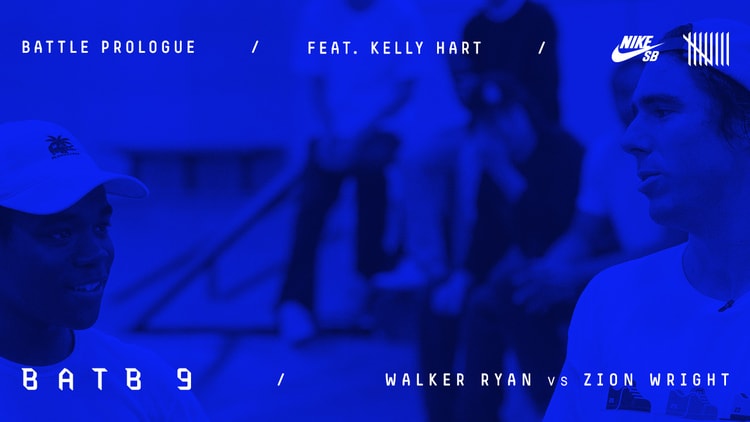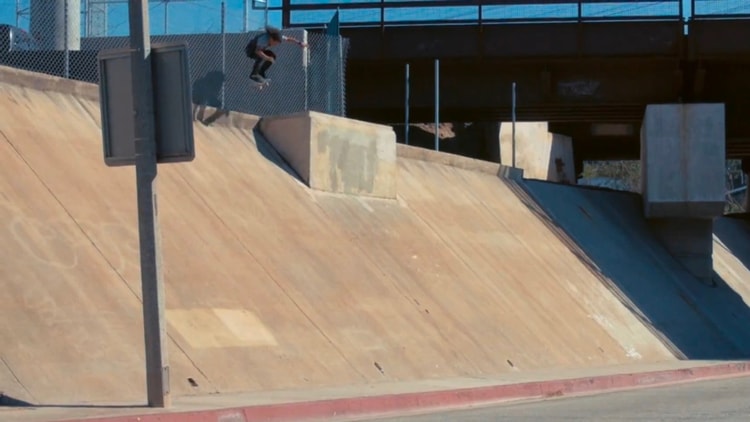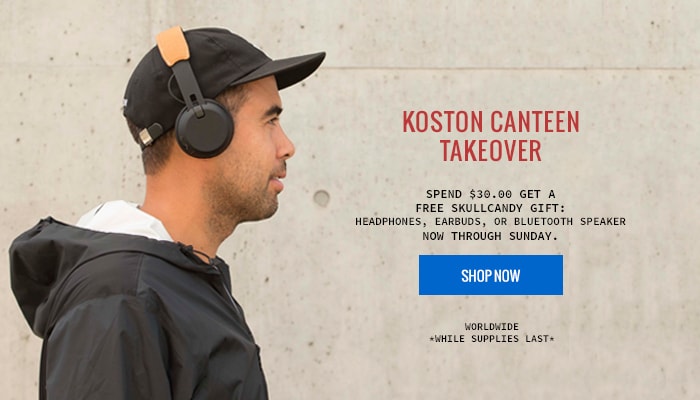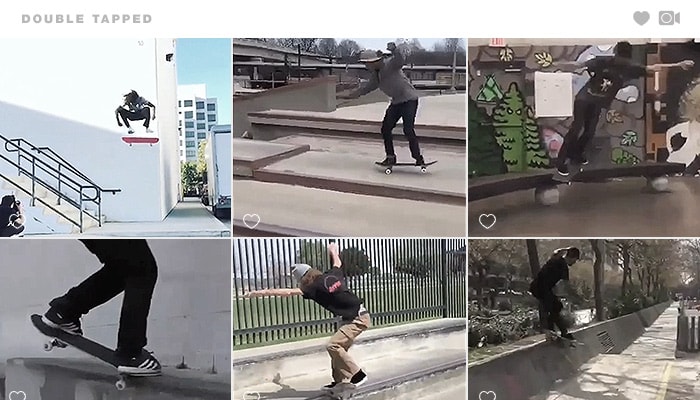BEYOND THE BERRICS: — Epicly Palestine’d

Originally a Watch This! submission, Beyond The Berrics is proud to present Theo Krish and Philip Joa’s independent film: Epicly Palestine’d: The Birth of Skateboarding in the West Bank, the story of how skateboarding became a vital force in a nation under military occupation, a nation whose space is under siege. These young Palestinians use skateboarding as the ultimate act of freedom, skating to live their lives on their own terms. As Abdullah Milhem a 16-year-old from Qalqilya, West Bank, and one of the first skateboarders in Palestine said to me, “Skateboarding gives a message to the occupation, no matter what they do and no matter how many walls they build, and how many people they kill, we will keep living our lives, because we are human beings too, and we deserve to live.”
In addition to our presentation of Epicly Palestine’d, I caught up with producers Theo Krish and Philip Joa, and the small group of Palestinian teenagers, who built a skate scene in the face of military occupation. These young men are the first to bring to a nation its initial glimpse of the empowerment of skateboarding, representing to an entire country what is skateboarding, and what it means to our lives.

As seen in the independent film, the skateboarding scene in Palestine has grown exponentially thanks to SkatePal and its founder Charlie Davis. Davis and SkatePal gave Palestinians a launching point to build upon what Abdullah Milhem, Aram Sabbah, Adham Tamimi, and Majd Ramadan began. The first SkatePal project was in Ramallah Village, building a four-foot mini-ramp, hosting classes every day for 8 weeks, for 50-60 kids. That being said, none of this came easily, Palestinian skateboarders directly challenged the beliefs of their society, their families, and of course, the restrictions of military occupation.
In the summer of 2014, SkatePal built the first cement skatepark in Khilab Centre, Zebabdeh, giving Palestinians their first real environment for skateboarding. Every trick you land in skateboarding opens up the door to new tricks, skateboarding expands your mind, your body, and helps you in your life. It teaches you how to get to places you’ve never been. Looking at how Palestinians are so attracted to skateboarding, opens our eyes to the momentous struggles of military occupation.

Everyday in Palestine there is a protest, maybe not always large marches, but every day escalations with the occupation lead to violence and more suffering. Through skateboarding the youth of Palestine has found a new form of protest, step by step, trick by trick, cementing more hope for a future of freedom in a nation under military occupation. Skateboarding is the future of Palestine, as SkatePal plans to build another skatepark in the West Bank. Skateboarding has given these Palestinians a goal, a new interpretation of life, providing them hope far beyond the walls of Palestine, beyond skateboarding, and Beyond The Berrics.
“It is a tool for peace, I have been to Israel and made friends with the Israeli skaters. They want peace just like me but unfortunately not everyone believes in peace. When I am riding my board, I feel free, and the wall surrounding my city just becomes a spot for wallrides.” The words spoken by Milhem, echo to the world the potential of skateboarding to revolutionize the lives of individuals.

Each Palestinian who picks up a skateboard find something far greater than seven layers of compressed maple. From their first push, they craft a way to conquer the mundane, they infuse themselves with an identity and become a family beyond skateboarding. They attain freedom in their expression of movement. In the act of skating there exists an underlying drive to combat the complacent norms of everyday life, to resist a society attempting to commandeer their perception of space. All skateboarders flourish against society’s attempt to incriminate our movement, in the face of ‘no skateboarding’ signs posted by the hundreds of thousands, pinning us against law enforcement and subscribing us to a juvenile caricature. From this resistance, their world is empowered by those very forces attempting to ostracize their freedom.

In this sense, their world is a proud confession of breaking through society’s contentment. And although all skateboarders protest society’s attempts to force us into complacency with our passion for skating at any cost, it becomes imperative to understand the ability to do so is paradoxically rooted in society’s recognition of our personhood. That is to say, most skateboarders live in a nation representative of our interests, recognizing our needs of skate parks, free enterprise, and mobility. Without access to a skate shop and relying solely on donations from outsider organizations, Palestinians have to overcome immense challenges to be skateboarders, something we around the world take for granted.
Milhem explains, “The largest challenge is the absence of skate shops in the West Bank, making it impossible for us to get boards. Israel has several skate shops actually, but to go there I need a permit which takes months to process and usually ends in rejection. The largest skate park is in Israel, only five-ten minutes from where I live but I can not go there because I do not have a permit.” Although Palestinians can not easily leave the confines of their walls, and have virtually no access to skate products, they continue to nurture a growing skate scene.
Adham Tamimi, a 19-year-old from Ramallah Village, would rather skate than not skate at all. “In the Israeli-occupied parts of Palestine, they are not under our control, so we forget about it and skate what we got. Sometimes you got to do what life forces you to do.” We may never be able to experience military occupation as Palestinians, but we can experience military occupation vicariously through the experiences of Westerners in the West Bank.
Natives of London, Theo Krish and Philip Joa provide us with the outsider perspective we can expect traveling through Palestine. Krish and Joa experienced the realities of military occupation on their first day filming for Epicly Palestine’d. “It was on our first day,” said Krish. “Crossing the boarder between Israel and Palestine, the big modern highways changed to rugged roads laden with potholes. You see army vehicles stationed at each junction and countless military checkpoints as you travel through the country. The occupation is all around you, you can never escape it.”
“Yeah, travelling between the two countries is bizarre,” said Joa. “You go from Israel, this Westernized country where you feel free and everything is normal, into Palestine where suddenly you’re behind this giant wall, and you’re under military occupation. There are roads Palestinians are not allowed to drive on, towns Palestinians are not allowed to live in, and Israeli soldiers are everywhere. You learn to appreciate the freedom we take for granted at home.” The film-makers left the West Bank with their perception of skateboarding changed forever, and a recognition of the profound drives of Palestinian skateboarders.
“They’re like young skateboarders anywhere – they’re completely bitten by the bug and won’t stop skating,” said Krish, after filming with the Palestinians for Epicaly Palestine’d. “I think these guys in particular are super determined – the lengths they go to in order to keep skating is amazing.”
“Palestinians have to deal with more barriers than most, in life generally, but in skating too; there’s not even a skate shop in the entire country,” reveals Joa. “But that’s the point, they want to live a normal life and just go skate. So that’s exactly what they do, no matter what it takes. For most of us skating is a release from daily stresses – a time to stop thinking about work, money, emails etc., and have fun. For these guys, skating is an escape from something much bigger, from walls and borders, stigmas and stereotypes from their families and communities… from war.” These young Palestinians like skateboarders around the world, are willing to do anything it takes to sustain the revolutionary aspects of skateboarding that make it so impactful on our lives.

Skateboarding has given Adham Tamimi, a 19-year-old from Ramallah Village, West Bank, a complete reformation of the interpretation of his environment, visualizing urban spaces no longer as products of war, but as potential skate destinations. “The way I look at things in life changed when I became a skateboarder. You know insane stuff be going on around you, and in your head amongst the chaos. Israel is killing hundreds of people I know or my family knows, but watching the news footage of cities outside the wall, you think to yourself, those are some nice ledges over there… I wish I could skate those.”
“Skateboarding is a tool for getting our freedom,” said Majd Ramadan, a 17-year-old also from Ramallah Village, West Bank. “And to be honest, no matter how many ways they try and stop us, we’re going to keep skating.”
Aram Sabbah, an 18-year-old from Jenin, West Bank, fell in love with skateboarding because it awarded him something nothing else could. “When I saw Adham [Tamimi] skating, falling but always getting back up, I knew at that moment I wanted to skate too. Skateboarding represented my strength in a way nothing else could, it changed my whole life in a way I thought impossible.”
The communities of these boys have issues attempting to grasp skateboarding for the first time. It is hard for people surrounding Adham and the Palestinian skateboarders to understand how riding a piece of wood with metal skates can go beyond the scope of war, giving them something greater than following the practices of their society. Sabbah, explains how skateboarding appears alien to his community. “It is different in Palestine, people do not recognize skateboarding as a sport or art, they always ask us what is that beneath your feet? What are you doing? They expect us to already be married and have a job. At first it felt like we were outsiders in our own city, with few actually supporting us.”
Milhem explains, “My community doesn’t accept me or encourage me in any way. They see me as a grown-ass-man playing with a kids toy. They do not understand what skateboarding is about or what it means to me. I hate to say this, but people in my city are religious conservatives who treat me like a freak. During the filming of Epicly Palestine’d, people were throwing rocks and glass bottles at us… that’s how bad it was.”
This group of Palestinians were the first to introduce skateboarding to an entire country, a country where spending your time skating goes against the beliefs of their cultural needs.

“I was the first one to skate in my city, people thought I was crazy and that I would kill myself at some point, but I didn’t care and kept on pushing because that fake rusty skateboard made me feel special, it was my way to express that energy that has always been caged by a conservative community. Skateboarding changed everything in my life, it gave me that feeling of freedom I never had before. It increased my confidence and taught me to never give up on myself. It changed my mindset and made me more optimistic about my life, in general skateboarding made me a better person.” It was challenging enough for Milhem and Palestinians to impact their community in a positive light through skating, especially when disapproval began with their families.
“They believe I am wasting my time because they do not understand the way it makes me feel, because they grew up in a period of war and poverty,” explains Milhem. “Skateboarding doesn’t seem like the best thing someone can do with their time, but I still love them and try to convince them to like it. Hopefully one day they’ll understand but I am not giving up no matter what happens, and no matter how many pressures and restriction there are, I will keep skating every damn day.” Skateboarding allows Palestinian youth to live beyond the realities of military occupation and the expectations of their families. From their dedication since the release of Epicly Palestine’d, skateboarding in Palestine is headed toward a bright future.

Milhem, Sabbah, Tamimi, and Ramadan, are just like all skateboarders, using the forces against them to drive their skating, providing a platform for the future of Palestinian skateboarding. As Ramadan explains, “Until recently people didn’t get the idea that anyone can skate – they thought it was just for kids. But for some people, they like it now. When they see someone skating in the middle of Ramallah in the streets, people stop what they’re doing and just watch, enjoying and smiling and taking some videos, you know?”
“I’m glad to have been one of the first skaters in Palestine,” said Milhem. “Because I know one-day people will appreciate what we’ve done and how hard we tried to break through the walls of occupation and traditions. I believe skateboarding will become even more accepted and will be developed by the up coming generations, including women! Hopefully they wont face the same challenges I faced. I hope to be an inspiration for all the next skaters, and to make them understand anything is possible if you’re committed to what you believe in.”
For skateboarders outside of the West Bank, we are comforted by the unity of disapproval from society, our families and so on. But it is up to us to show these Palestinians they are not alone inside the West Bank walls; they are a vital part of the skateboarding family and we applaud them for bringing a new form of protest to the occupation of Palestine.
For more information on how you can help SkatePal in their efforts to ensure the growth of the Palestinian Skate scene, visit www.Skatepal.co.uk
Written by Zane Foley, Associate Editor
Participants:
Theo Krish
Philip Joa
Abdullah Milhem
Aram Sabbah
Adham Tamimi
Majd Ramadan
Photographers:
Emil Agerskov
Mohammad Othman



